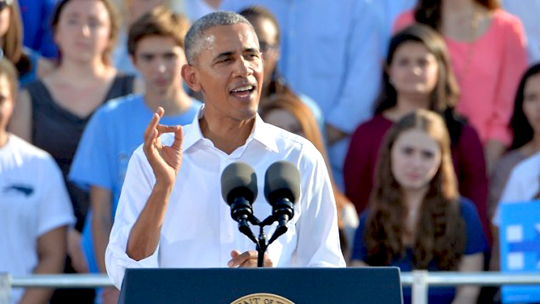North Carolina, Nov 3: President Barack Obama pressed Democrats black and white to vote in droves for Hillary Clinton Wednesday, warning Donald Trump was a threat to hard-earned civil rights, the country and the world.

Painting the choice next Tuesday in the starkest terms yet, America`s first black president trashed Trump as "uniquely unqualified" to be president.
Clinton remains the firm favorite to become the 45th US president, but with six days until Election Day Democrats are leaving nothing to chance given Trump`s radical stances.
"The fate of the Republic rests on your shoulders," Obama told voters in Chapel Hill. "The fate of the world is teetering and you, North Carolina, are going to have to make sure that we push it in the right direction."
Decrying electoral apathy, Obama reminded voters that he had won North Carolina by the slightest of margins in 2008 and that just decades ago African Americans were cheated out of their right to vote in parts of the United States.
"I won North Carolina by two votes per precinct," he said "How can you say your vote doesn`t count?"
Around a quarter of North Carolina`s population is black.
"I am not on the ballot, but I tell you what. Fairness is on the ballot. Decency is on the ballot. Justice is on the ballot. Progress is on the ballot. Our democracy is on the ballot."





Comments
Add new comment